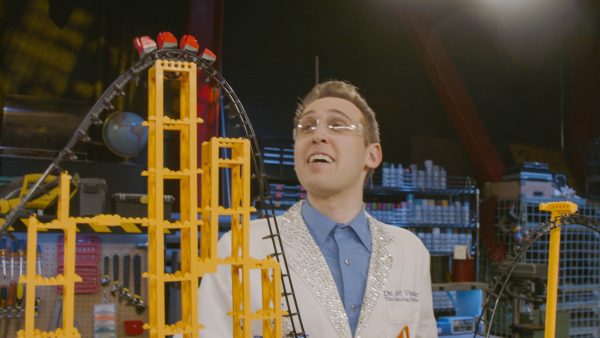Energy Definition
Energy makes things happen. For example, we can describe how it behaves in systems.
View Lesson on Potential vs. Kinetic Energy
Become a member to get full access to our entire library of learning videos, reading material, quiz games, simple DIY activities & more.
Become a member to get full access to our entire library of learning videos, quiz games, & more.
Plans & Pricingto watch this full video.

Access All Videos
and Lessons, No Limits.
Access All Videos

No credit card required,
takes 7 sec to signup.
No card required

Ready-to-go lessons
that save you time.
Ready-to-go lessons
If you are on a school computer or network, ask your tech person to whitelist these URLs:
*.wistia.com, fast.wistia.com, fast.wistia.net, embedwistia-a.akamaihd.net
Sometimes a simple refresh solves this issue. If you need further help, contact us.
Potential vs. Kinetic Energy
Fun Facts
- The composition of an object determines what kind of energy it has (e.g. chemical, thermal).
- Energy transfers between objects and systems.
- Energy is conserved. When the energy of one object decreases, the energy of at least one other must increase.
Why Do We Need To Know About Energy
Learning about kinetic and potential energy helps you see how engineers and designers fix real-world problems. Knowing about these energies is important for making things like safer football helmets and car airbags to protect people in crashes.
This knowledge is also used in making exciting amusement park rides and working prosthetic limbs. Engineers use these ideas to make sure rides are fun but safe, and to create artificial limbs that move like real ones, helping people with disabilities.
Frequently Asked Questions
Check out the Full Lesson on Potential vs. Kinetic Energy
In this lesson, we learn that:
- Kinetic energy is the energy of motion.
- Potential energy is stored in an object based on its position.
- Energy can change between potential and kinetic based on an object's motion.
Related Topics
- Adaptation Definition
- Atom Definition
- Biomimicry Definition
- Biosphere Definition
- Cast Fossils Definition
- Chemistry Definition
- Chloroplast Definition
- Coastal Erosion Definition
- Comparative Anatomy Definition
- Convergent Boundary Definition
- DNA Definition
- Definition Of Force
- Definition Of Living Things
- Earth’s Axis Definition
- Earthquake Definition
- Electricity Definition
- Electromagnet Definition
- Element Definition
- Energy Definition
- Frequency Definition
- Greenhouse Gases Definition
- Heating And Cooling Definition
- Hydrosphere Definition
- Inclined Plane Definition
- Kinetic Energy Definition
- Liquid Definition
- Liquid Nitrogen Definition
- Magnetic Field Definition
- Meteorologist Definition
- Mitochondria Definition
- Moon Definition
- Nervous System Definition
- Newton’s 2nd Law Of Motion Definition
- Partial Eclipse Definition
- Plant Definition
- Pollinator Definition
- Potential Energy Definition
- Pulley Definition
- Renewable Energy Definition
- Seismologist Definition
- Simple Machines Definition
- Sound Wave Definition
- Species Definition
- Sun Definition
- Sunlight Definition
- Tissue Definition
- Virus Definition
- Volts Definition
Start a Free Trial Today. Get a $5 Amazon Gift Card!
Teachers! Start a free trial & we'll send your gift card within 1 day. Only cards left. Try it now.
Select Grade
Select Subject
This email is associated with a Science Kit subscription. Kit subscriptions are managed on this separate page: Manage Subscription

-
Download InvoiceScience & Math$/yr
-
Download InvoiceScience Only$/yr

access all lessons
• No credit card required •
"My students loved the videos. I started the video subscription in May and used them as a review before the state test, which I know contributed to 100% of my class passing the state test."
Rhonda Fox 4th Grade Teacher, Ocala, Florida
• No credit card required •
"My students loved the videos. I started the video subscription in May and used them as a review before the state test, which I know contributed to 100% of my class passing the state test."
Rhonda Fox 4th Grade Teacher, Ocala, Florida
• No credit card required •
Already a member? Sign In
* no credit card required *

* no credit card required *
* no credit card required *


no credit card required
Skip, I will use a 3 day free trial
Enjoy your free 30 days trial
-
Unlimited access to our full library
of videos & lessons for grades K-5. -
You won’t be billed unless you keep your
account open past your 14-day free trial. -
You can cancel anytime in 1 click on the
manage account page or by emailing us.
-
Unlimited access to our full library of videos & lessons for grades K-5.
-
You won't be billed unless you keep your account open past 14 days.
-
You can cancel anytime in 1-click on the manage account page.
Cancel anytime in 1-click on the manage account page before the trial ends and you won't be charged.
Otherwise you will pay just $10 CAD/month for the service as long as your account is open.
Cancel anytime on the manage account page in 1-click and you won't be charged.
Otherwise you will pay $10 CAD/month for the service as long as your account is open.
We just sent you a confirmation email. Enjoy!
DoneWe use cookies to make your experience with this site better. By using this site you agree to our use of cookies. Click "Decline" to delete and block any non-essential cookies for this site on this specific property, device, and browser. Please read our privacy policy for more information on the cookies we use.Learn More
We use cookies to improve your experience. By using this site, you agree to our use of cookies. Click "Decline" to block non-essential cookies. See our privacy policy for details.Learn More




























































































































